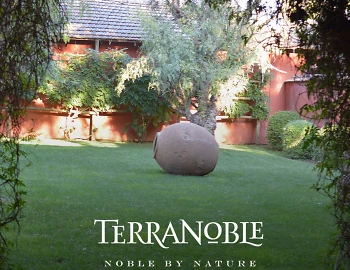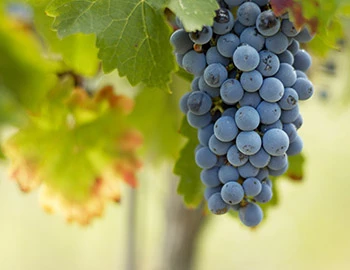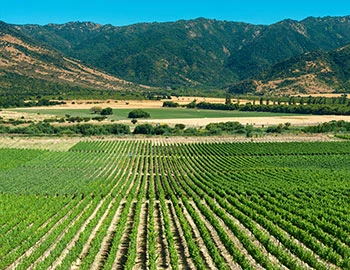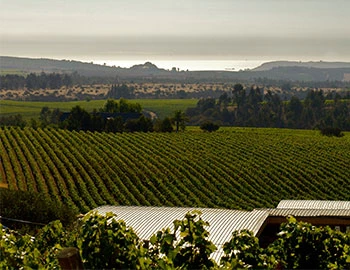Merlot Reserva 2021
Maule Valley, Terra Noble, 750 ml

| Grape variety: | Merlot |
| Producer: | Viñedos Terranoble |
| Origin: | Chile / Valle Central / Maule |
| Other vintages: |
Description
The grapes are refrigerated before vinification with maceration for 4 days. The harvest is largely stemmed. Fermentation takes place under controlled temperatures up to 28°C. The wine is then aged without any wood.
Attributes
| Origin: | Chile / Valle Central / Maule |
| Grape variety: | Merlot |
| Label: | Vegan |
| Ripening potential: | 1 to 5 years |
| Drinking temperature: | 16 to 18 °C |
| Food Pairing: | Cold fish dish, dried meat, Bistecca fiorentina, T-Bone steak, Spaghetti alla bolognese, Spaghetti con sugo al basilico, Cheese board |
| Vinification: | fermentation in steel tank, short must fermentation, fermentation at low temperatures |
| Maturation: | in steel tank |
| Volume: | 13.5 % |
| Note: | Contains sulphites |
Viñedos Terranoble
Soon after their arrival, the first Spanish colonists were already remarking the ideal vine growing conditions in Chile. In this country of great contrasts, embedded between the Andes and the Pacific Ocean, the many wine regions differ significantly through micro-climate, topography and altitudes, and geological properties. TerraNoble owns vineyards in three different regions and so can provide different varieties with the most suitable growing conditions.
The big estate La Higuera stands in the Maule valley, in the southern part of the Central valley, some 250 Km from the capital Santiago, and cultivates a wide range of grape varieties. Further north, a Mediterranean climate nurses the Colchagua Valley which fits particularly well to the needs of the Cabernet Sauvignon, the Carmenère and the Syrah grapes: in Los Lingues at the foot of the Andes where the offset temperature reaches 20°C between night and day, and in Los Cactus along the coastline. The Casablanca Valley, strongly influenced by the nearby Pacific with morning fog and little rain, is more suiting for other varieties like the Chardonnay or the Sauvignon Blanc.

Merlot
Everybody’s darling
Merlot is the most charming member of the Bordeaux family. It shines with rich colour, fragrant fullness, velvety tannins and sweet, plummy fruit. It even makes itself easy for the vintner, as it matures without issue in cool years as well. This is in contrast to the stricter Cabernet Sauvignon, which it complements as a blending partner. Its good qualities have made the Merlot famous worldwide. At over 100,000 hectares, it is the most-planted grape in France. It also covers large areas in California, Italy, Australia and recently in Eastern Europe. The only catch is that pure Merlot varieties rarely turn out well. Its charm is often associated with a lack of substance. Only the best specimens improve with maturity. They then develop complex notes of leather and truffles. This succeeds in the top wines from the Bordeaux appellation of Pomerol and those from Ticino, among others.

Maule
Maule: the heart of Chilean viticulture
With a cultivation area of nearly 30,000 hectares, Chile's largest wine cultivation area is also the southernmost sub-region of the Valle Central. Situated roughly 250 kilometers south of the capital of Santiago, the Cabernet Sauvignon variety and the Chilean specialty, Carménère, demonstrate their excellent potential here. Spanish immigrants in Maule had already established the first vineyards in the 16th century. In the last 20 years, the trend has moved towards fruitier wines with slightly lower alcohol content.

Valle Central
Valle Central: the heart of Chilean viticulture
Valle Central comprises the four most important wine-growing areas in Chile. It starts in the southern outlying districts of the capital, Santiago, and stretches around 400 kilometres to the south, ending at the city of Parral. Red Bordeaux varieties occupy over 70 percent of total vineyard area. Depending on how strongly the particular microclimate is influenced by the cool influence of the Andes or the Pacific, stylistically varied wines result. Specialties like Carménère, Syrah and Carignan are gaining ground.

Valle Central
Valle Central: the heart of Chilean viticulture
Valle Central comprises the four most important wine-growing areas in Chile. It starts in the southern outlying districts of the capital, Santiago, and stretches around 400 kilometres to the south, ending at the city of Parral. Red Bordeaux varieties occupy over 70 percent of total vineyard area. Depending on how strongly the particular microclimate is influenced by the cool influence of the Andes or the Pacific, stylistically varied wines result. Specialties like Carménère, Syrah and Carignan are gaining ground.

Valle Central
Valle Central: the heart of Chilean viticulture
Valle Central comprises the four most important wine-growing areas in Chile. It starts in the southern outlying districts of the capital, Santiago, and stretches around 400 kilometres to the south, ending at the city of Parral. Red Bordeaux varieties occupy over 70 percent of total vineyard area. Depending on how strongly the particular microclimate is influenced by the cool influence of the Andes or the Pacific, stylistically varied wines result. Specialties like Carménère, Syrah and Carignan are gaining ground.

Chile
Chile – Where fortune came from tragedy
Wine-growing in Chile was born less out of economic reasons than lifestyle. Like the rest of the world, its aristocratic landowners admired everything that came out of France. They imitated French culture, built their haciendas in French architectural styles, and took trips to France. In 1851, the first French vines were brought back and formed the basis for producing quality wines.



